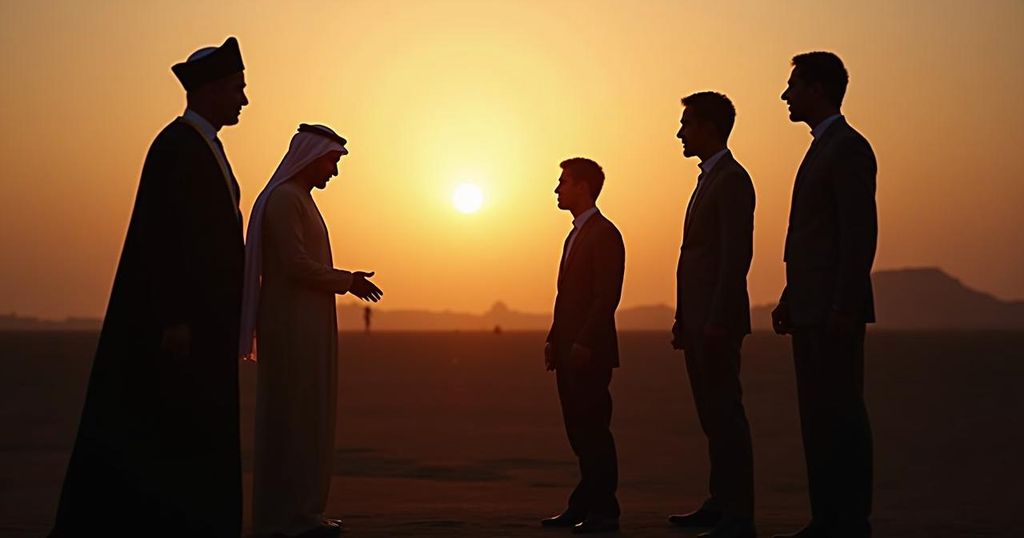Iran’s Diplomatic and Military Moves: Pezeshkian’s Visit to Qatar and Joint Exercises with Oman
Iranian President Masoud Pezeshkian is traveling to Qatar to strengthen diplomatic ties amid ongoing conflicts involving Israel. He will attend the 19th Asian Cooperation Dialogue and conduct high-level meetings, showcasing Iran’s desire to enhance its influence in the region. Simultaneously, Iranian ground forces are conducting joint military training with Oman, signifying a deepening relationship between the two countries and reflecting Iran’s strategic goals within the Gulf region.
President Masoud Pezeshkian of Iran is set to visit Qatar on Wednesday, following his recent attendance at the UN General Assembly in New York, where the Iranian delegation was notably active. During his visit to Doha, he will engage in discussions with the Emir of Qatar and attend the 19th Asian Cooperation Dialogue (ACD) Summit. Pezeshkian’s trip, extended at the invitation of Sheikh Tamim bin Hamad bin Khalifa Al Thani, demonstrates Iran’s strategic intent to strengthen diplomatic affiliations amid ongoing conflicts involving its proxies against Israel. The ACD, established in June 2002, serves as a continental platform for Asian nations aiming to foster solidarity without duplicating existing organizations. Iran’s involvement in this dialogue aligns with its broader efforts to enhance ties with regional powers like Turkey, Russia, and China, particularly as it engages in economic initiatives under frameworks such as BRICS and the Shanghai Cooperation Organization (SCO). Furthermore, amid this international engagement, Iranian ground forces have initiated joint military training exercises with Oman, dubbed “Mountain Falcons 1”. This collaboration reflects Iran’s burgeoning relationship with Oman, a nation often perceived as neutral within the region’s geopolitical sphere. The exercise emphasizes joint combat readiness and operational collaboration, although it is crucial to distinguish these Iranian forces from the more ideologically-driven Islamic Revolutionary Guard Corps. Iran’s commitment to forging warmer relations with Qatar and its military cooperation with Oman occur against a backdrop of increased tensions with Israel and regional instability caused by Iranian-backed groups. Oman’s role, typically characterized as a stabilizing influence, may complicate perceptions of its military engagements with Iran. This diplomatic maneuvering and joint military efforts underscore Iran’s intentions to enhance its influence within the Gulf and broader Asian regions, seeking security and operational readiness among like-minded states amidst fluctuating geopolitical dynamics.
The article addresses the recent diplomatic and military activities of Iran under President Masoud Pezeshkian’s leadership. As he embarks on a significant visit to Qatar for high-level talks and a key summit, the Iranian government is simultaneously cultivating military relationships, such as the joint training exercises conducted with Oman. This dual approach not only reinforces Iran’s positioning within Asia but also highlights its strategies to counter Israeli operations and maintain regional visibility. The ACD summit signifies Iran’s commitment to Asian cooperation amidst a complex geopolitical landscape, where alliances and partnerships can shift dramatically, especially concerning traditional adversaries such as Israel.
In conclusion, President Masoud Pezeshkian’s upcoming visit to Qatar and the associated military exercises with Oman serve to enhance Iran’s diplomatic stature and military readiness in a region fraught with conflict. As Iran seeks to bolster its relationships with pivotal nations and navigate the intricate web of alliances and hostilities, these developments reveal a tactical approach to assert influence while addressing security concerns amid ongoing tensions with Israel. The strategic engagements reflect an evolving narrative where diplomatic efforts are intertwined with military preparedness in response to regional dynamics.
Original Source: www.jpost.com




Post Comment